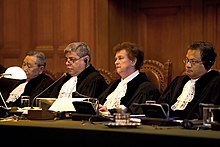 Judges at the International Court of Justice | |
| Occupation | |
|---|---|
| Names | Judge, justice, magistrate |
Occupation type | Profession |
Activity sectors | Law, Justice |
| Description | |
Education required | University degree in law and experience as a lawyer |
Fields of employment | Courts |
Related jobs | Barrister, prosecutor |
A judge is a person who presides over court proceedings, either alone or as a part of a panel of judges. In an adversarial system, the judge hears all the witnesses and any other evidence presented by the barristers or solicitors of the case, assesses the credibility and arguments of the parties, and then issues a ruling in the case based on their interpretation of the law and their own personal judgment. A judge is expected to conduct the trial impartially and, typically, in an open court.
The powers, functions, method of appointment, discipline, and training of judges vary widely across different jurisdictions. In some jurisdictions, the judge's powers may be shared with a jury. In inquisitorial systems of criminal investigation, a judge might also be an examining magistrate. The presiding judge ensures that all court proceedings are lawful and orderly.